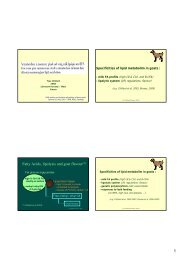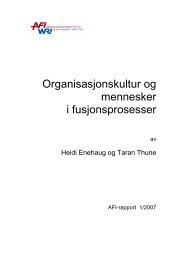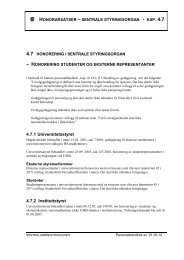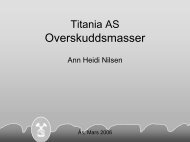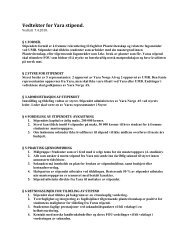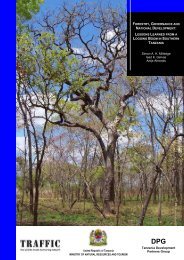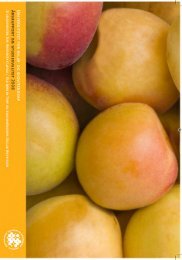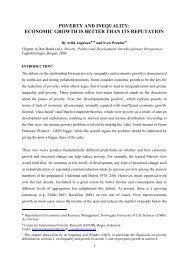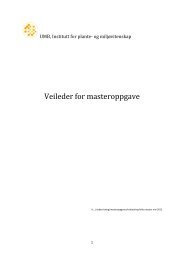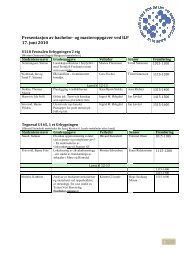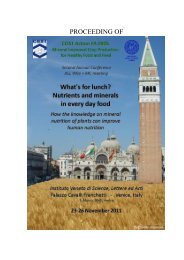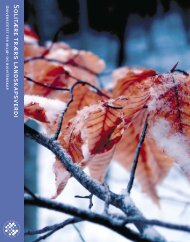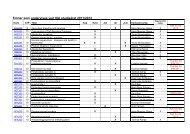Sustaining Livelihoods through Organic Agriculture in Tanzania - UMB
Sustaining Livelihoods through Organic Agriculture in Tanzania - UMB
Sustaining Livelihoods through Organic Agriculture in Tanzania - UMB
You also want an ePaper? Increase the reach of your titles
YUMPU automatically turns print PDFs into web optimized ePapers that Google loves.
Chapter Three: Methods<br />
‘A truly alternative agriculture must be based on a truly alternative science<br />
that articulates multiple ways of know<strong>in</strong>g.’<br />
(Kloppenburg, 1991: 542)<br />
The research strategy adopted <strong>in</strong> this study of the <strong>Tanzania</strong>n organic sector has been<br />
<strong>in</strong>formed and <strong>in</strong>spired by a wide range of different qualitative and reflective<br />
methodological approaches. Apply<strong>in</strong>g multiple perspectives to food and farm<strong>in</strong>g<br />
systems is characteristic of agroecology, which has been described by Callicot (1988:<br />
6; quoted <strong>in</strong> Lockeretz & Anderson, 1983: 74) as ‘a vanguard movement <strong>in</strong> opposition<br />
to the atomism and reductionism, and materialism of the prevail<strong>in</strong>g but obsolete<br />
paradigm ... [provid<strong>in</strong>g] a systemic, <strong>in</strong>tegrative, holistic understand<strong>in</strong>g of reality at the<br />
level of organic terrestrial nature’. Thus the methods of the research are set with<strong>in</strong><br />
philosophical frameworks which reflect ‘notions of the way the world is, the nature of<br />
knowledge, and the very disposition and ethical framework which the researcher<br />
br<strong>in</strong>gs to bear’ (Bawden; <strong>in</strong> Zuber-Skerritt, 1991: 19).<br />
In the tradition of agroecology, therefore, the research design has <strong>in</strong>tegrated elements<br />
of action research, systems th<strong>in</strong>k<strong>in</strong>g, agroecosystem analysis, farm<strong>in</strong>g systems<br />
research, case study research, participatory learn<strong>in</strong>g and action, the susta<strong>in</strong>able<br />
livelihoods framework and other approaches to agricultural research. It is thought that<br />
these approaches and perspectives ‘may accomplish <strong>in</strong> conversation what none of<br />
them can alone’ (Kloppenburg, 1991: 542).The follow<strong>in</strong>g discussion outl<strong>in</strong>es the ma<strong>in</strong><br />
theoretical underp<strong>in</strong>n<strong>in</strong>gs of the research strategy, and expla<strong>in</strong>s why these particular<br />
approaches have been chosen for this study of the <strong>Tanzania</strong>n organic sector.<br />
3.1 Action Research<br />
Action research may be def<strong>in</strong>ed as ‘an approach <strong>in</strong> which the action researcher and a<br />
client collaborate <strong>in</strong> the diagnosis of a problem and <strong>in</strong> the development of a solution<br />
based on the diagnosis’ (Bryman, 2004). The aim of action research is to allow<br />
knowledge to emerge <strong>through</strong> collaborative effort by jo<strong>in</strong><strong>in</strong>g forces with people<br />
fac<strong>in</strong>g a problem to help them study and resolve it. Put simply, the start<strong>in</strong>g po<strong>in</strong>t of<br />
action research is therefore a researcher jo<strong>in</strong><strong>in</strong>g with an <strong>in</strong>dividual or group of people<br />
who are concerned about their situation.<br />
The action research approach comb<strong>in</strong>es the key attributes of consultancy and research.<br />
In this context, the role of the researcher is more of a reflective consultant or<br />
facilitator who enables problems to be solved <strong>through</strong> co-learn<strong>in</strong>g than of an objective<br />
“outsider”. Thus <strong>in</strong> action research the <strong>in</strong>vestigator is very much part of the field of<br />
study, whilst also be<strong>in</strong>g <strong>in</strong>volved <strong>in</strong> the collection of data. Action research therefore<br />
attempts to comb<strong>in</strong>e the two acknowledged tasks of the academic tripod, education<br />
and research, with the third more neglected task of community outreach.<br />
Professional action researchers are challenged to assume some of the skills normally<br />
related to ethnography and community development work <strong>in</strong> order to susta<strong>in</strong> projectrelated<br />
learn<strong>in</strong>g and participation (Whyte, 1991). Other skills useful <strong>in</strong> participatory<br />
action research <strong>in</strong>clude teach<strong>in</strong>g, communication, scientific enquiry, encourag<strong>in</strong>g<br />
participants to respond critically, work<strong>in</strong>g with community groups and cop<strong>in</strong>g with<br />
socio-cultural distances.<br />
16



